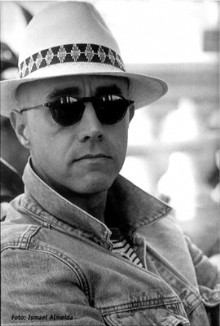
I am an advocate of difference, both in life and in art. That’s why I don’t like to repeat myself. I always say that my job is to open doors and not to close them.
Juan Carlos Cremata Malberti, from an interview with Margaret Atkins in Cuba Absolutely
The Vancouver Latin American Film Festival is proud to host Juan Carlos Cremata Malberti, one of Cuba’s leading contemporary film and theatre directors, to present a retrospective of three of his most representative films. Mr. Cremata will also serve as the President of the Jury for narrative films.
Born in Havana’s Vedado district in 1961, Juan Carlos Cremata Malberti began his career as a writer, actor and director for children's television programs made for the Cuban Institute of Radio and Television (ICRT) from 1981 to 1987. His work won him six CARACOL awards from the Cuban National Union of Writers and Artists (UNEAC), and a Diploma in Honour of Cultural Achievement from the Cuban Ministry of Culture. Cremata obtained a Dramatic Arts degree in 1986 from the Higher Institute of Art (ISA) in Havana. In 1990, he went on to graduate with a Diploma in Cinema, Video and Television Directing from the Escuela Internacional de Cine y Televisión (EICTV) de San Antonio de los Baños. His thesis film Oscuros rinocerontes enjaulados (DarkCaged Rhinoceros) screened at numerous film festivals including in Clermont-Ferrand, France, and has since become part of the archive of the Museum of Modern Art in New York.
Cremata has travelled to over 45 countries throughout his career, presenting his films, giving artist talks and leading workshops on film editing, screenwriting and directing. From 1994 to 1995, he was a professor of Film Editing at the Universidad de Buenos Aires and professor of
Film Directing at the Escuela Panamericana de Diseño y Publicidad and the Centro de Experimentación en Cine y Video (CIEVIC) in Argentina.
In 1996, he won a Guggenheim Fellowship and spent a year working in New York City, but as he says in an interview with Vanessa Arrington in the Havana Journal, “It was this year, living in the centre of New York, with lots of money and everything, that I realized all I wanted was to return to Cuba and make Cuban films.”
In his career, Cremata has directed over 50 television episodes, two short films, one documentary,The Epoch, the Enchantment and the End of the Century (1999), and four feature-length narrative films: Nada+ (2001), Viva Cuba (2005), The Skimpy Prize (2009) and Chamaco(2011), the latter two adapted from plays by well-known Cuban playwrights.
For his work, he has won over 54 international prizes including the Grand Prix Écrans Juniors for Best Children’s Film at Cannes and the Best First Film Award at the Festival of New Latin American Cinema in Havana. Viva Cuba, which won more than 30 national and international awards, is one of the most widely acclaimed films in the history of Cuban cinema. With his innovative visual composition and wide-ranging style, Juan Carlos Cremata Malberti is truly a master of cinematic storytelling.
